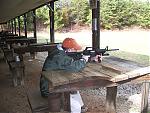Checkpoint 20 was the last piece of American-controlled terrain on the road to Hawr Rajab and our linkup point with Sheik Ali Majid al-Dulaimi. Before heading out, Lt. Col. Mark Odom surveyed the terrain from the rooftop of the nearby American combat outpost, a heavily sandbagged structure surrounded by concrete walls to guard against car bombs. A dusty town on the southern outskirts of Baghdad, Hawr Rajab had a strategic importance that belied its humble appearance. It straddled the infiltration routes used by Sunni militants to circumvent Lion’s Gate, the grandiloquently named system of checkpoints, canals and other obstacles designed to stop the suicide attacks that had brought havoc to the Iraqi capital.
Hawr Rajab had been under the dominion of Al Qaeda in Mesopotamia, a predominantly Iraqi group that took its inspiration from Osama bin Laden and whose senior echelons are filled by foreign jihadis. The group’s fighters in Hawr Rajab were armed with AK-47s, machine guns, rocket-propelled grenades, mortars and a seemingly endless supply of homemade improvised explosive devices (I.E.D.’s), many of which were concocted from urea fertilizer and nitric acid. They were hard to detect and yet powerful enough to destroy an armored vehicle. Odom’s soldiers had never driven into the town without encountering some form of “contact,” as his soldiers matter-of-factly referred to the clashes.
This day in early August, however, was to mark a turning point. Just a month earlier, the Americans acquired a new ally: Sheik Ali, a leader of the Dulaimi tribe. In an extraordinary development, a growing number of Sunnis who had sympathized with the insurgency or even fought American forces were now more concerned with removing Al Qaeda from their midst — so much so that they had chosen to ally with their supposed occupiers. Such expedient confederations were emerging across Iraq. They began last year when Sunni tribes and former insurgents in western Anbar Province began cooperating with American forces, cropped up later in the violent Diyala Province and even emerged in the sharply contested Ameriya neighborhood in Baghdad.
...










 "A Sherman can give you a very nice... edge."- Oddball,
"A Sherman can give you a very nice... edge."- Oddball, 
Bookmarks